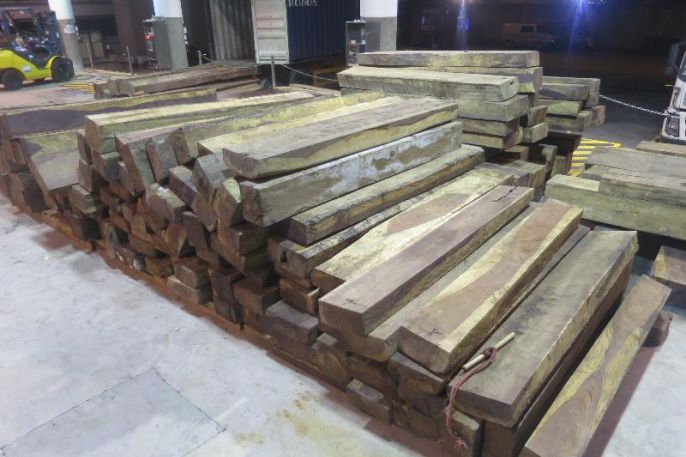Campaigners say new global rules to protect endangered tree species will be a test for Hong Kong, already grappling to deal with its role as a conduit for illegal timber flooding into China to meet demand for fancy furniture.
Hong Kong’s location on China’s southern coast has long made the port a main transit point for ivory, other endangered animal products and for large volumes of wood in an international illegal timber trade worth up to USD100 billion (HKD775 billion).
China and Hong Kong have until Jan. 2 to implement a U.N. Convention on International Trade in Endangered Species (CITES) rule set in October requiring a permit for the vast majority of international rosewood species.
The rule comes as demand in China for antique-style furniture booms, fed by a state-supported furniture industry on the look-out for wood from around the world.
While demand in China for ivory and shark fin have waned, largely because of public awareness bolstered by celebrity campaigns, it is the biggest consumer of illegal timber, much of which has recently been coming from Madagascar.
Prices of high-end rosewood can reach USD1 million (HKD7.7 million) for individual pieces.
For the scale of the problem, environmental campaigners point to a record seizure in 2015 when Hong Kong authorities confiscated 1 million kilograms of endangered Madagascan rosewood, en route to a state-owned Chinese company.
The seizure is still being held and no one has been prosecuted.
“A million kilograms of rosewood is gigantic,” said Alex Hofford, a conservation activist based in Hong Kong.
“Try visualizing 1,000 tonnes – a small forest – now sitting inside scores of forty-foot containers in a shipping yard.”
The timber trade has grown to feed many of the more than 30,000 Chinese companies which generate more than USD26 billion (HKD201 billion) selling to domestic shoppers, according to the conservation group Forest Trends.
Chinese regulations to protect its own forests, and the absence of laws prohibiting the import of illegal wood, have made it increasingly reliant on imports.
“This combination has made China the principal hub, ‘black box’ or ‘laundering machine’, for illegal timber,” said David Gehl, a program coordinator at the Environmental Investigative Agency in Washington.
‘Overwhelmed’
Hong Kong’s Agriculture Fisheries and Conservation Department said local law would be amended to reflect the change under CITES.
“We will endeavor as always to maintain our enforcement efforts and momentum to combat illegal trade in endangered species including rosewood,” a department spokesman said in an emailed statement.
The Hong Kong Customs and Excise Department declined to comment on the CITES rule but said it works with local and overseas counterparts to prevent and detect illegal shipments of any prohibited items, including endangered species.
Campaigners say authorities have their work cut out.
“The customs generally are quite overwhelmed by the amount of trade and volume through Hong Kong,” said Yannick Kuehl, regional director at the TRAFFIC wildlife trade monitoring network.
“It’s a difficult job as is. Hong Kong is just playing a small part in a much bigger global game.”
The 2015 seizure of rosewood was bound for Fujian Provincial Yaohua Foreign Trade Corp., a state-owned enterprise based in China’s Fujian province.
Fujian Provincial declined to comment when contacted by Reuters. The company says on its website it is the only large-scale state-owned foreign trade enterprise in the province. It lists its main products as granite, marble and sculptures.
The ship it arrived on, Min Feng, was managed by Hai Ling Shipping, which also handles some vessels owned by the Ministry of Commerce, according to shipping records.
Fujian-based Wu Wen Liang, who is listed in records as the owner of the Min Feng, declined to comment.
“Hong Kong really needs to step up because there is so much more that can happen when you have done a seizure,” said Kuehl.
“The police work should actually start with a seizure not end with a seizure.”
Volumes of African rosewood being imported to China have recently surpassed those from Asia, due to its lower quality which means cheaper prices.
Madagascar, despite a 2006 logging ban, exports 98 percent of its rosewood to China, according to TRAFFIC.
CITES has given Madagascar until the end of the year to show progress on stopping illegal shipments or it will face a trade ban on all species listed under the convention.
Johanita Ndahimananjara, Madagascar’s minister of environment, ecology and forests told Reuters there had been no rosewood trafficking for more than a year and a half despite recent seizures.
Though she did confirm demand.
“China is the main destination of Madagascar rosewood.”
Words: Reuters
Got a tip? Send it to us at hongkong@coconuts.co




